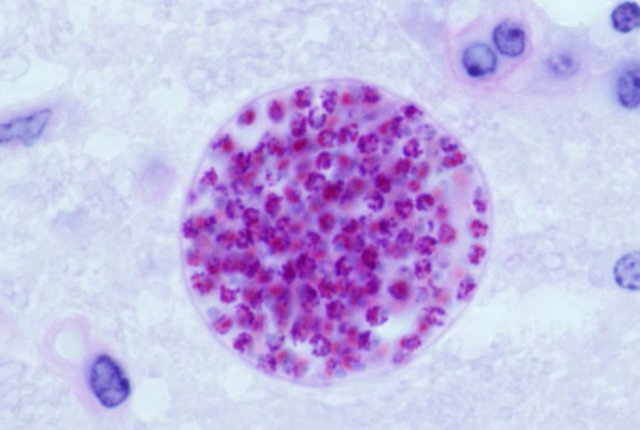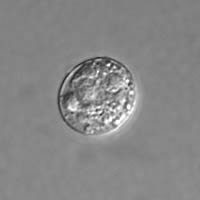Will toxoplasmosis make you like cats? Let's take a closer look at the disease and the parasite that is responsible for it!
Toxoplasma gondii is a small protozoan parasite that is found all over the world. This parasite is well known for its ability to infect the host with a disease known as toxoplasmosis, but is it really true that this parasite makes you like cats more? To answer that, we need to take a closer look at the parasite and the disease, in order to understand how this works.

An image of the Toxoplasma gondii tissue cyst, here inside a mouse's brain. And don't worry, you will know what a tissue cyst is by the end of this post. Image is public domain.
The life cycle of the Toxoplasma gondii
The life of a Toxoplasma gondii starts as an oocyst that is located in a feline’s excrements. The oocysts are cysts with a zygote (a fertilized sex cell) that are covered by a thick protection barrier. These oocysts will spread into the soil, water, food or anything else, and can survive for several months outside of a host.
The oocysts will eventually enter the intestines of a warm-blooded mammal, usually by being eaten along with the food or soil it lays within. After 7 to 10 days, the parasite will have gone through several life stages, ending up as a parasite that multiplies itself asexually inside the host.
The parasite will eventually spread into most of the body of the host by using the blood stream, producing tissue cysts that will keep multiplying and infect more and more cells. This is the part of the life cycle that is problematic to infected animals, and the parasite will keep doing this forever. If you are infected with toxoplasmosis, there will be lots of tissue cysts inside you right now, that are multiplying asexually to keep infecting new cells inside your body. Most animals will have a chronic infection, but humans have developed several different drugs to get rid of the infection.

An image of the oocyst of a T. gonddi. Image is public domain.
By the way, if you are infected, make sure to see a doctor as soon as possible. It is much easier to kill it off before it spreads to the entire body, and most people will not even get a real treatment after this stage has been reached. This is because antibiotics can effectively get rid of the parasite, but this does not work very well after is has developed into the stage that makes tissue cysts. If you don't get any medical help, there is probably no need to worry, most infected people won't get any symptoms.
However, the T. gondii cannot continue its life cycle in this host. It needs to find a feline (a domesticated or wild cat) to complete it life cycle. Do be able to do this, it needs to come into contact with a cat, and it has several methods to do this.
How the parasite affects rodents
If a rodent, such as a mouse or a rat, get infected with toxoplasmosis, the parasite will be able to alter the hosts behavior to be less afraid of cats. This in turn increases the rodent’s chance to get killed by a cat, and the parasite has now reached its final host, where it is able to undergo sexual reproduction and keep the next generation going.
In addition to not being shy of the cats, the rodents also gets a reduced motor function, so they are less likely to be able to escape from a feline attack. These two factors ensures that rodents that are infected will get killed by a cat, so the parasite can reproduce.
How toxoplasmosis affects humans
Humans are also affected by the toxoplasmosis, which is the name of the disease when it form tissue cysts in non-feline warm-blooded mammals. Some of the observed behavioral changes include reduced psychomotor performance (the relationship between cognitive functions and physical movement), depression, and (maybe) schizophrenia.
A study about reaction tests found that humans infected with the parasite did worse at this test, and also lost their attention more quickly, than the control group. The infected people are also more likely to be involved in traffic accidents, so there is good reason to believe the motor functions of infected humans are also reduced.
Some studies have found that people with schizophrenia are way more likely to have the infection, which lead them to believe that the parasite increased the chance to get schizophrenia. However, another study also attempted to test this, and they did not find any correlation, so one of the test were obviously wrong. So, it might increase the chance of getting schizophrenia, or it might not.
The disease will not usually be dangerous, as most people don't even get symptoms. However, people with reduced autoimmune functions, such as persons with AIDS, can get serious problems from toxoplasmosis, and it might even be fatal for them to get infected. It can also hurt the babies of pregnant women, so women that are pregnant are recommended to stay away from cats during the gestation.
How many people are infected with toxoplasmosis?
Studies have shown that somewhere between 30 % and 50 % of the global population is infected with the toxoplasmosis disease, but most people do not have any symptoms! In the US, about 23 % of the population is infected, and in developing countries, the number might be as high as 95 %.
You are actually pretty likely to have the disease if you do some of the following stuff:
- Touch cat poo.
- Ear raw, unwashed vegetables or fruit.
- Eat undercooked or raw meat.
The first point sounds a little stupid, because who in their right mind would touch cat poo? Actually, when people are working in the garden, clean up after their cat, or play in a sandbox, there is a big risk of being in contact with cat excrements during these activities.
Generally speaking, people who own a cat are more likely to be infected than people without cats. Children seems to be more exposed to the parasite than grown-ups, probably because they are more likely to do stuff like putting their fingers in their mouths without washing it first.
You can also get the infected from another non-feline host, such as from a bite or scratch from other mammals. This can also include eating cyst-infected meat (usually pork and sheep). Getting infected in this manner is less likely than being infected by the oocysts directly from the cat excrement, but it can still happen.
So, if you grew up in a family that had one or more cats, you have a pretty high chance to be infected with the parasite. Hopefully I have not scared you too much with all the negative aspects of the infection, because you have probably had it for years already, and are not going to be losing more motor functions any time soon.
Will the infection make you like cats?
Some scientists think being infected by the toxoplasmosis disease will make you more likely to want to pet cats. However, this is kind of a “Chicken or the egg” problem. If studies were made to check for this, one would have to take into account that people who originally liked cats are more likely to get infected, so the basis of the study will be skewered. For example, if a person hates cats, he is unlikely to own a cat, or pet neighborhood cats, and are therefore less likely to be infected. Cat-owners are on the other hand more likely to be infected, but one would also think that these people are more likely to already like cats, because why would they have cats as pets if they did not like them?

Do you want to pet it? If you do, you might have toxoplasmosis. Or, you might not have it, but still like cats. Image is public domain.
Anyway, some scientists thinks that humans will be more likely to like cats if they are infected with the disease. This behavior is clearly seen in rodents when experimented on, and it is scientifically accepted that the infection can alter the human behavior, so it might be entirely possible that the infection will make you like cats.
The Crazy Cat-Lady Syndrome
When the media reported any stories about infection of toxoplasmosis, they coined up the term “Crazy Cat-Lady Syndrome”. This was especially used when the news reported on the discoveries that toxoplasmosis was linked to increased chance of having schizophrenia and behavioral issues (and in case you did not read the entire post, has been debated with new studies suggesting that it might not be linked).
Thanks for reading
Thank you for reading my post about toxoplasmosis! This disease and the parasite is really interesting, and we have only scratched the surface on all the information that is available about these, so make sure to check out the sources if you want more information.
Sources
- The Wikipedia pages on toxoplasmosis and T. Gondii have lots of good information.
- A lot of good information is also found on the DCD’s website for toxoplasmosis.
About the author
Hi, I’m @valth! I live in Norway with my pregnant girlfriend and our two dogs, one of which is seen wearing a bowtie in the profile picture!
I am very passionate about nature and biology, and have been studying ecology for a few years now. My passions are mostly within conservation biology, mycology (the studies of mushrooms), animal behavior and general microbiology. I really enjoy both the theoretical aspect, as well as the more practical aspect of biology, and I spend about as much time in front of biology textbooks as I do spend on finding and identifying plant, mushroom and animal species in the forests.
Make sure to hit the big follow button above to get my posts right in your feed! I get really happy when I see my follower number increase ;)

My wife was born with this condition. It has caused her severe hardship as a child. At least now a days we understand it better and have better solutions. Nice post
I'm sorry to hear that @mallorcaman.
Hmm, as a cat-lover I might need a check-up. I always thought this parasite was harmless to humans. Thanks for sharing!
Don't worry, it is usually harmless. If you don't have any symptoms, there is no need to worry about it, unless you also have a disease that affects your immune system, like HIV or other diseases like it.
Nope, I feel fine! But I think I'm a 100% sure I have the parasite as my cats sleep in my bed and here in Cambodia cats aren't well looked after... so I'm usually the one who gives all the cats in the street some love too.
Hehe, you probably have it then. I'm pretty sure I have it myself, having grown up in a house with a few cats. I played a lot in my sandbox in my garden when I was young, and I would pretty often dig up cat excrement while playing, so it would be pretty incredible if I don't have the disease :P
ah that explains why my sister in law is called "the crazy cat lady" by all the kids on the block and she is wacked in the head too! Course we got cats too but we're ok